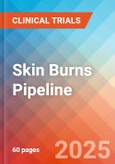Skin Burns of Pipeline Development Activities
The report provides insights into:
- All of the companies that are developing therapies for the treatment of Skin Burns with aggregate therapies developed by each company for the same.
Skin Burns key players involved in targeted therapeutics development with respective active and inactive (dormant or discontinued) projects.
Drugs under development based on the stage of development, route of administration, target receptor, monotherapy or combination therapy, a different mechanism of action, and molecular type.
Detailed analysis of collaborations (company-company collaborations and company-academia collaborations), licensing agreement and financing details for future advancement of Skin Burns market.
The report is built using data and information traced from the researcher's proprietary databases, company/university websites, clinical trial registries, conferences, SEC filings, investor presentations, and featured press releases from company/university web sites and industry-specific third-party sources, etc.
Skin Burns Analytical Perspective
In-depth Skin Burns Commercial Assessment of products
This report provides a comprehensive commercial assessment of therapeutic drugs that have been included, which comprises of collaborations, licensing, and acquisition deal value trends. The report also covers company-company collaborations (licensing/partnering), company-academia collaborations, and acquisition analysis in both graphical and tabulated form in a detailed manner.Skin Burns Clinical Assessment of products
The report comprises of comparative clinical assessment of products by development stage, product type, and route of administration, molecule type, and MOA type across this indication.Scope of the Report
- The Skin Burns report provides an overview of therapeutic pipeline activity and therapeutic assessment of the products by development stage, product type, route of administration, molecule type, and MOA type for Skin Burns across the complete product development cycle, including all clinical and nonclinical stages.
- Detailed Skin Burns research and development progress and trial details, results wherever available, are also included in the pipeline study.
Report Highlights
- A better understanding of disease pathogenesis contributing to the development of novel therapeutics for Skin Burns.
The companies and academics that are working to assess challenges and seek opportunities that could influence Skin Burns R&D. The therapies under development are focused on novel approaches to treat/improve the disease condition.
A detailed portfolio of major pharma players who are involved in fueling the Skin Burns treatment market. Several potential therapies for Skin Burns are under investigation. With the expected launch of these emerging therapies, it is expected that there will be a significant impact on the Skin Burns market size in the coming years.
Our in-depth analysis of the pipeline assets (in early-stage, mid-stage and late stage of development for the treatment of Skin Burns) includes therapeutic assessment and comparative analysis. This will support the clients in the decision-making process regarding their therapeutic portfolio by identifying the overall scenario of the research and development activities.
Key Questions
- What are the current options for Skin Burns treatment?
- How many companies are developing therapies for the treatment of Skin Burns?
- What are the principal therapies developed by these companies in the industry?
- How many therapies are developed by each company for the treatment of Skin Burns?
- How many Skin Burns emerging therapies are in early-stage, mid-stage, and late stage of development for the treatment of Skin Burns?
- Out of total pipeline products, how many therapies are given as a monotherapy and in combination with other therapies?
- What are the key collaborations (Industry-Industry, Industry-Academia), Mergers and acquisitions, and major licensing activities that will impact Skin Burns market?
- Which are the dormant and discontinued products and the reasons for the same?
- What is the unmet need for current therapies for the treatment of Skin Burns?
- What are the recent novel therapies, targets, mechanisms of action and technologies developed to overcome the limitation of existing Skin Burns therapies?
- What are the clinical studies going on for Skin Burns and their status?
- What are the results of the clinical studies and their safety and efficacy?
- What are the key designations that have been granted for the emerging therapies for Skin Burns?
- How many patents are granted and pending for the emerging therapies for the treatment of Skin Burns?
This product will be delivered within 1-3 business days.








